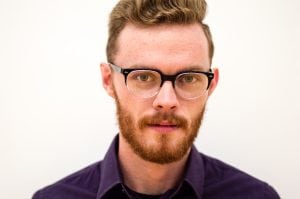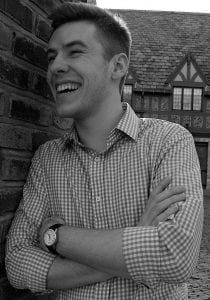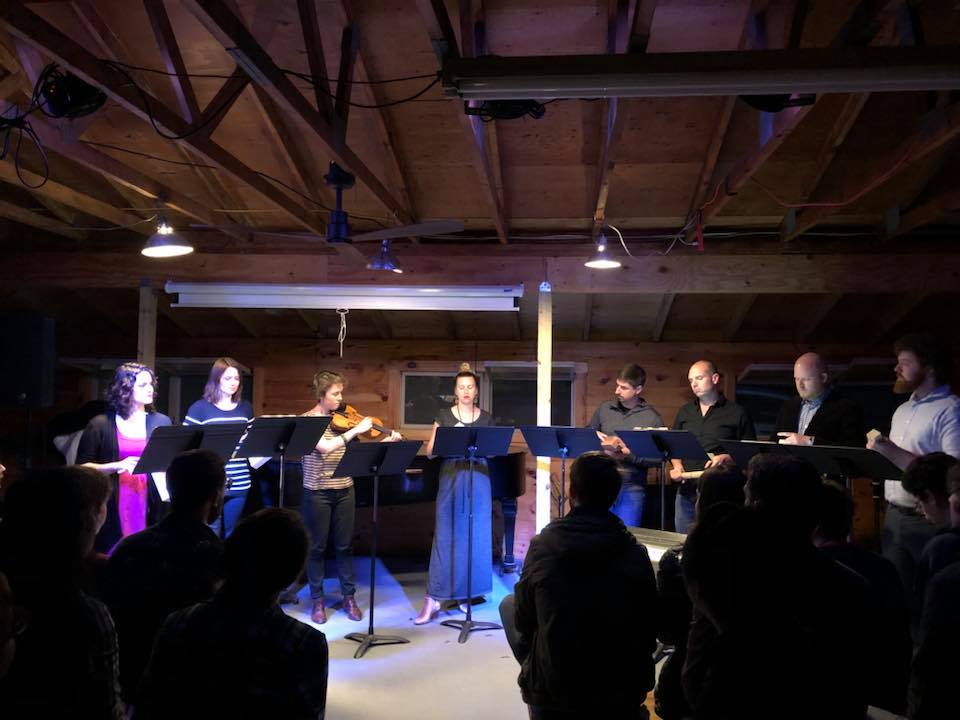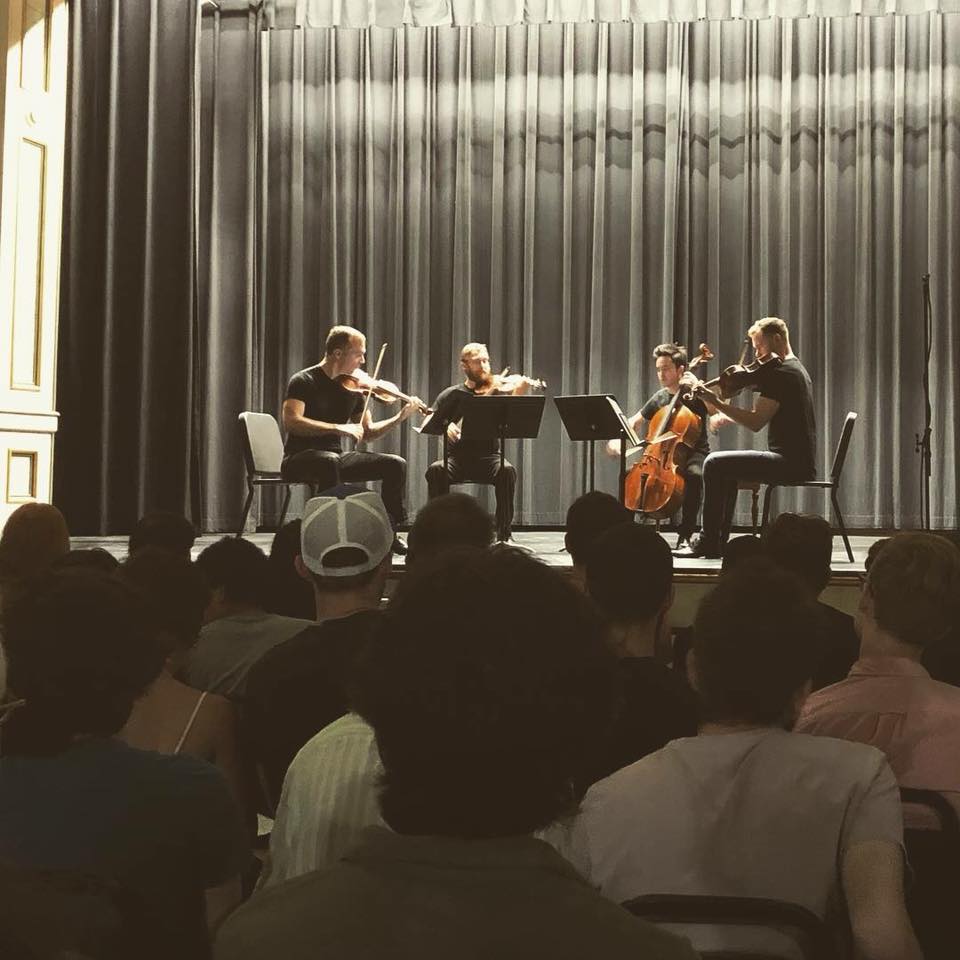By James May & Cullyn Murphy, Special to The Sybaritic Singer
In many ways, summer music festivals are largely the same. Student participants, numbering anywhere from a dozen to over 100, travel to a single location to engage in one to eight weeks of music making. In the New Music world, these students usually include composers—sometimes are only composers—and entire concerts or festivals are dedicated to contemporary repertoire. If you’re a performer, you get more experience under your belt; if you’re a composer, you usually get a premiere and recording or two; and regardless, you get guidance from world-class professionals, the opportunity to meet new colleagues, and the chance to share your work with others. Given that, we attended New Music on the Point (NMOP) this June, and can safely say that the experience we received was above and beyond the rudimentary expectations of a summer festival
NMOP takes place in the mountains of rural Vermont along Lake Dunmore. 50 students and over a dozen faculty spend two weeks in cabins, share excellent meals at 10–person tables, and split their time between lessons, rehearsals, kayaking, presentations, concerts, swimming, practicing, and eating. This is not an event of hectic commuting, of convening for a scattered few hours in the day and then dispersing to your hotel or dorm or homestay; nearly all the week’s events, official and not, take place on the cozy Point CounterPoint campsite, where dinner is at 6pm and then the concert starts at 8pm in the adjacent room.
This closeness and communal living, at its core, is what sets NMOP apart from other festivals. Students don’t only learn from guests; they live with them, eat with them, and build remarkable relationships with the professionals who attend. And, to be clear, the names are nothing to sneeze at—guests this year included Amy Williams (artistic director), George Lewis, Eve Beglarian, Ted Hearne, Juraj Kojs, Miya Masaoka, Brad Balliet, Tony Arnold, Jane Rigler, Robert Black, Jan Williams, Chris Dietz, and Roomful of Teeth and JACK Quartet.
However, this isn’t just a matter of snagging the biggest names possible and making them camp together; Williams has put in the years of leg-work to curate an environment that has a distinct personality, one already attractive to the people invited. During one meal I [James] had with Amy Williams and Caroline Shaw, we were chatting about how we came to the festival, and I remarked that everyone I had spoken with about NMOP absolutely gushed about their experience—to which Shaw responded, “That is totally true. I’ve never heard anyone say a bad thing about this festival.” Because the expectation is set, the festival takes on fresh characteristics where faculty both teach and can showcase their personal interests; Eve Beglarian and Ted Hearne can perform their own works while George Lewis lectures on improvisation, in addition to having his notated works performed.
So that’s all well and good—but what actually happened at NMOP? Between June 5th & 18th, there were 11 concerts, not including extra events like reading sessions with the guest ensembles, an Open Mic Night, or a film contest. It was a very busy schedule, and not everybody made it to every concert, but the performances operated at such an astonishingly high level that the quality justified the inundation, many times over.
Concerts rotated between showcasing faculty performers and composers, student performers (either performing their own repertoire or work assigned them by Amy Williams), and the ensembles in residence; featured works were by composers including Alex Mincek, Kate Moore, Per Nørgård, Merrill Garbus, Amy Beth Kirsten, György Kurtag, Conlon Nancarrow, and all of the guest faculty members.
The final two concerts were dedicated to the premiere of new works by the 32 composition students, performed by chamber groups comprising student performers and a faculty member. Over the two weeks, composition students additionally received three lessons with guest faculty, a reading & recording session with one of the guest ensembles, and three rehearsals + dress rehearsal of your festival piece.
Every day, there was a presentation given by one of the guest faculty on their work (everybody presented), short presentations given by the composition students, and a series of masterclasses, workshops, and talks. The topics of these ranged from money management to Just Intonation to improvisation (participatory!) to the variety of vocal techniques Roomful of Teeth incorporates into their work. Plus, all of the guests were incredibly gracious with their spare time, and would happily have an unscheduled lesson, a conversation about career paths, or a masterclass with you if asked.
And in the cracks of this saturated schedule? We chatted. We enjoyed being lakeside in beautiful Vermont summer weather. We had discussions about power, privilege, class, race, and the steps we as individuals need to take to acknowledge and address these imbalances in our field. We stayed up late with a bonfire (or finishing our reading assignments), then got up early for a sound walk. We went to Burlington for a day trip, went hiking. Despite what seemed like an overwhelming amount of activity, in actuality we were allowed so much time that conversations quickly moved past “talking shop” and into personal connections. There was no personal dorm room to escape to (just a bunk bed amidst many other bunk beds), and no hairy logistics to coordinate in order to spend more time together outside the schedule. There was just NMOP, the talented people in it, and a lot of amazing new music.
 James May is a composer, conductor, experimental performer, and pianist from Pittsburgh, PA. His music focuses on texture, timbre, and space, and has been performed/recorded by JACK Quartet, the San Francisco Choral Artists, and Renate Rohlfing (Longleash piano trio). James is also a contributing writer to icareifyoulisten.com and 1/
James May is a composer, conductor, experimental performer, and pianist from Pittsburgh, PA. His music focuses on texture, timbre, and space, and has been performed/recorded by JACK Quartet, the San Francisco Choral Artists, and Renate Rohlfing (Longleash piano trio). James is also a contributing writer to icareifyoulisten.com and 1/
 Cullyn D. Murphy is a composer, conductor, vocalist, and educator from Champaign, IL whose work focuses on theatricality, function of language, and absurdity. He spent the past year workshopping and performing his piece, Agony, with his newly formed trio, AmiEnsemble. Recently he has collaborated with JACK quartet, Hillary LaBonte, and the Longleash Trio. Cullyn received his B.M.E. in Music Education and B.M. in Music Composition at Illinois State University, his M.M. in Music Composition from the University of Louisville, and recently started his Ph.D. in Composition and Theory at the University of Pittsburgh where he was awarded the Dietrich School of Arts & Sciences Fellowship. https://soundcloud.com/cullynmurphy
Cullyn D. Murphy is a composer, conductor, vocalist, and educator from Champaign, IL whose work focuses on theatricality, function of language, and absurdity. He spent the past year workshopping and performing his piece, Agony, with his newly formed trio, AmiEnsemble. Recently he has collaborated with JACK quartet, Hillary LaBonte, and the Longleash Trio. Cullyn received his B.M.E. in Music Education and B.M. in Music Composition at Illinois State University, his M.M. in Music Composition from the University of Louisville, and recently started his Ph.D. in Composition and Theory at the University of Pittsburgh where he was awarded the Dietrich School of Arts & Sciences Fellowship. https://soundcloud.com/cullynmurphy


